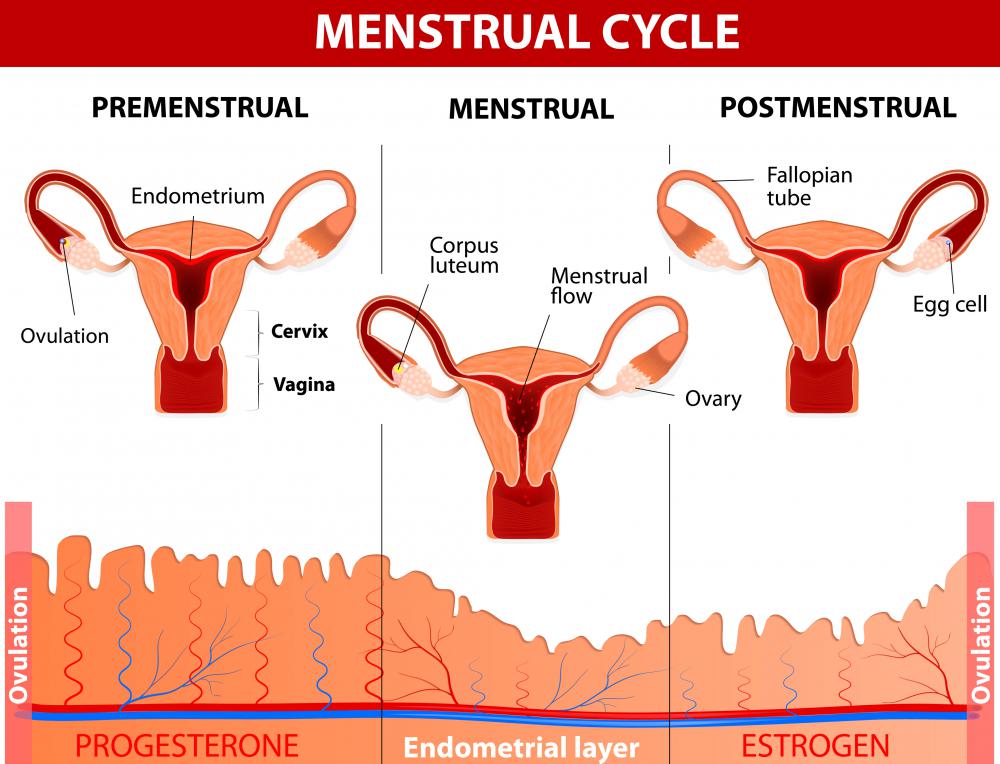At WiseGEEK, we're committed to delivering accurate, trustworthy information. Our expert-authored content is rigorously fact-checked and sourced from credible authorities. Discover how we uphold the highest standards in providing you with reliable knowledge.
How do I Treat Menstrual Headaches?
Menstrual headaches are painful headaches that strike many women just before or at the beginning of a menstrual period. Thought to be caused by hormone shifts in the body, many women suffer from severe menstrual headaches, as well as various other symptoms including nausea, cramping, diarrhea, and fatigue. Treating most menstrual headaches can be done naturally or with medication, but in severe cases, prescription medication may be required.
Just before a woman gets her period, levels of progesterone and estrogen plummet in the body. This is one of the many signals that the body has not been impregnated and the uterine lining will shed, causing a menstrual period. Experts believe that it is the hormonal change that can bring on headaches and migraines in pre-menstrual and menstruating women.

Treating menstrual headaches naturally includes taking a few extra mineral supplements. Natural health experts suggest beginning a course of magnesium, riboflavin, and Vitamin E a few days before a period is due. These supplements can be taken separately or may be combined in a multivitamin. Some experts also suggest that a daily multivitamin geared toward women's health may reduce headaches all month long, but especially around menstruation.

One of the most common ways to treat menstrual headaches is by taking simple, over-the-counter painkillers. Drugs that contain ibuprofen or acetaminophen are generally considered good for the relief of headaches. Some medical experts warn against taking drugs that contain aspirin during a menstrual period, as it may sometimes increase bleeding. With any medication, it is important to follow dosage instructions carefully to avoid complications or overdose.

Some studies suggest that women taking birth control pills may have a higher occurrence of menstrual headaches. The trigger appears to be from the large hormone drop that occurs when switching to placebo pills during the final week of a cycle. Oral contraceptives that have lower amounts of estrogen and progesterone tend to cause less of a dramatic drop and, therefore, fewer headaches. Ask a doctor about switching brands if headaches significantly worsen while on birth control.

In some cases, headaches or migraines may be so severe that they require medical attention. A doctor may recommend a course of over-the-counter medication beginning about 10 days before each period. In some cases, doctors may provide a prescription for a strong anti-migraine medication, or related drugs such as beta or calcium blockers. If headaches continue after a prescription has been used, it is important to go back to the doctor for further testing. What may seem like a menstrual headache could actually have a different underlying cause, and it may be important to get a full physical check-up if headaches continue.
AS FEATURED ON:
AS FEATURED ON:
















Discussion Comments
Sometimes, relief is as uncomplicated as two acetaminophen and a nap. Menstrual headaches may be complicated by tension also, so a neck massage may be helpful, as well.
Some health food stores offer mint scented cream that is applied to the temples to help relieve the headache, and these actually do work.
The old home remedy of a cool, damp cloth on the forehead can also give a lot of relief, as can lying down in a dark, quiet room. Noise tends to make any headache worse, as can bright light, so dark and quiet can help many symptoms, including the headache, cramps, backache, stress and moodiness. Naps are good things.
Post your comments